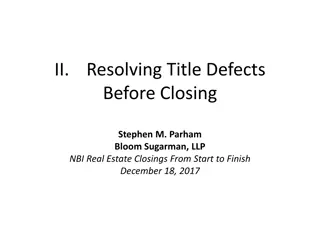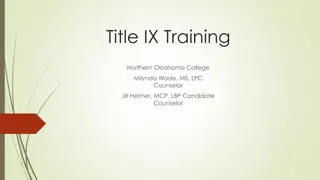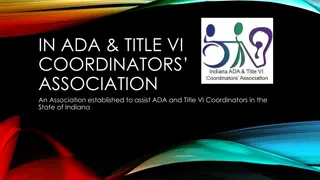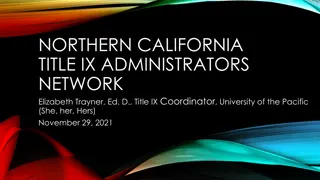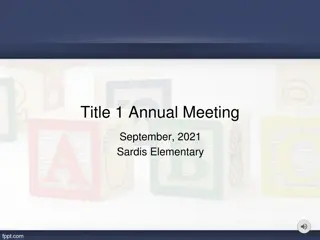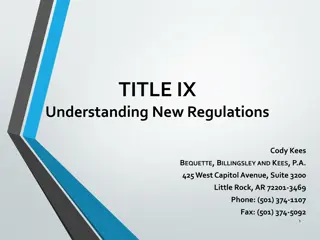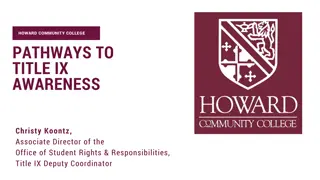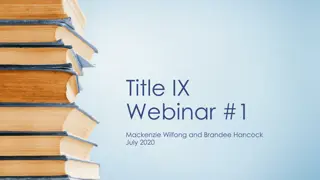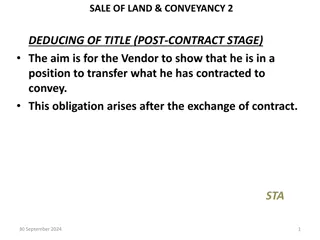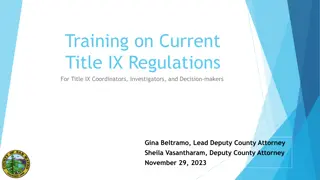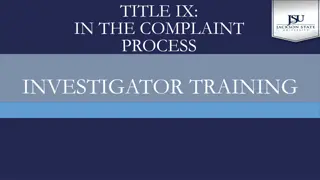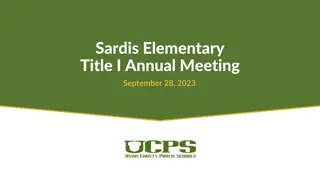Understanding Title IX Training and Processes
This content delves into the importance of Title IX training, outlining prohibited conducts like sexual harassment and discrimination. It explains the parties involved - complainants, respondents, and advisors. The process at colleges, investigation steps, and supportive measures are detailed, emphasizing the need for effective handling of sexual misconduct cases.
Download Presentation

Please find below an Image/Link to download the presentation.
The content on the website is provided AS IS for your information and personal use only. It may not be sold, licensed, or shared on other websites without obtaining consent from the author. Download presentation by click this link. If you encounter any issues during the download, it is possible that the publisher has removed the file from their server.
E N D
Presentation Transcript
AGENDA Overview Investigations Hearings Best Practices Mock Hearing
WHAT CONDUCT IS PROHIBITED IN ACCORDANCE WITH TITLE IX? Sex Discrimination Sexual Harassment (irrespective of gender identity or sexual orientation) Dating violence Gender-based harassment Sexual assault Domestic violence Stalking So long as any of the above occurred within an education program or activity. Those Who Have Been Retaliated Against or Reported, Testified, Assisted or Participated in an Investigation, Proceeding, or Hearing under this policy
WHO ARE PARTIES TO A TITLE IX PROCEEDING? Complainant- Individual who is alleged to be the victim of conduct that could constitute Sexual Harassment. Respondent-An individual who has been reported to be the perpetrator of conduct that could constitute sexual harassment. Advisors -Advisors are required to be: Professionals-Attorneys or experienced advocates Adults, capable of understanding the purpose and scope of cross-examination
TITLE IX PROCESSES (CONT.) College s Duties: In cases of sexual harassment, the College will keep Complainant s identity confidential (including from Respondent) unless supportive measures require disclosure (no-contact order) Individuals are encouraged to report sexual misconduct that may also violate criminal law to the College and local law enforcement as the processes are mutually exclusive When a formal complaint is processed, the Complainant cannot remain anonymous or have their identity not disclosed to Respondent. Upon a formal complaint, the Title IX Coordinator makes contact with Complainant and discusses supportive measures available and considers the Complainant s wishes with respect to Supportive Measures. Determine if a Respondent needs to be removed from the student s educational program on an emergency basis
SEVEN STEPS FOR EFFECTIVE INVESTIGATIONS 1. Make a plan. 2. Collect relevant information. 3. Interview the reporting party. 4. Interview individual against whom report was made or subject. 5. Interview relevant witnesses. 6. Follow up with reporting party and subject. 7. Prepare report.
INTERVIEWING GUIDELINES Opening and closing statements. I m here to look into some allegations that have been made. I want to understand what you have seen or heard. Limited confidentiality (need to know for purposes of conducting investigation). Anti-retaliation. Treat interviewee with dignity.
INTERVIEWING GUIDELINES (CONT.) Questions Open-ended and broad, not leading Chronological Tough or embarrassing questions Then go to specifics Allow silence. Look for contradictions. Evaluate body language. Consider the interviewee s motives. Be curious. Leave no questions unanswered.
INTERVIEWING GUIDELINES (CONT.) Review notes and documentation issues. Provide adequate time. Ask witnesses about other witnesses. Take notes.
INTERVIEWING GUIDELINES (CONT.) Closing Statement Anything else I should know? Any other documents I should review? Anyone else I should speak with?
TITLE IX PROCESS HEARING Live or Virtual Hearings Hearing Panel Empaneled decision-makers composed of faculty and staff. Neither the Title IX Coordinator, the investigator nor a Party s advisor shall serve as a decision-maker Hearing Officer The decision-makers shall appoint one decision-maker to also serve as the hearing officer ( Hearing Officer ). The Hearing Officer shall oversee the hearing in accordance with this Policy.
TITLE IX PROCESS WITNESS EXAMINATION Complainant, Respondent, Investigator, Witnesses Direct Examination Cross Examination Advisor
DIRECT EXAMINATION Questioning of witness by the party who called the witness The questions must be open-ended in nature Who, What, When, Where, Why, or How Generally they cannot be leading questions
TITLE IX PROCESS WITNESS EXAMINATION Cross-Examination Only relevant cross-examination and other questions may be asked of a Party or witness. The Hearing Panel must permit each Party's advisor to ask the other Party and any witnesses all relevant questions and follow-up questions, including those challenging credibility. Such cross-examination must be conducted directly, orally, and in real time by the Party's Advisor of choice and never by a Party personally.
EVIDENCE CONSIDERATIONS 1. Relevance 2. Credibility
WHAT IS RELEVANT? Mantra: Is the fact or information that is being offered likely to prove/disprove an issue in the investigation? If it is likely to prove/disprove, even indirectly, it is relevant. If it is not likely to do so, it should not be considered.
RELEVANCE AND RAPE SHIELD LAWS Relevance: something that has a connection to the question being decided so that it makes one fact or another more or less likely to be true Not relevant: Questions and evidence about the Complainant's sexual predisposition Questions and evidence about the Complainant s prior sexual behavior, except: (i) when offered to prove that someone other than the Respondent committed the alleged conduct; or (ii) when specific incidents of the Complainant's prior sexual behavior with respect to the Respondent and are offered to prove Affirmative Consent. Information protected by a legally-recognized privilege (e.g., attorney-client, physician-patient)
WEIGHING CREDIBILITY Role Relationship Motive Relevance Supporting Evidence Delivery and Demeanor
More Notes on Determining Witness Credibility: EEOC recommends using the following factors: Plausibility: Is the witness s version of the facts believable? Does it make sense? Demeanor: Does the witness seem to be telling the truth? Motive: Does the person have a reason to lie? Corroboration: Are there documents or other witnesses that support the witness s version of events? Past record: Does the subject of the complaint have a past record of inappropriate behavior?
SEVEN FACTORS TO CONSIDER 1. Compare verifiable facts to witness statements. 2. Are there major inconsistencies in testimony? 3. Do neutral witnesses corroborate or contradict? 4. Are there documents such as diaries, calendar entries, journals, notes or letters describing the incidents? 5. What have witnesses told others? 6. Have there been similar complaints against the respondent? *** 7. Do any of the witnesses have a motivation to lie, exaggerate or distort information?
OBTAINING TESTIMONIAL EVIDENCE Open-ended questions will generate more information while closed-ended questions will clarify specifics. When possible, start with open-ended questions (What happened?) rather than close-ended ( Did you go to the bar? ). Close-ended questions result in yes/no responses that often don t offer much additional information. Open-ended questions will allow the person to answer as long as he or she desires, possibly yielding more information than requested. Use close-ended questions to obtain specifics and clarify information that you have already received.
OBTAINING TESTIMONIAL EVIDENCE Be compassionate and respectful: Keep in mind that questioning, while sometimes necessary, may make the investigation feel adversarial and put both everyone involved on the defensive. Ask the difficult but relevant questions: Ask the questions that are needed for a thorough exploration of the facts.
OBTAINING TESTIMONIAL EVIDENCE Silence is ok: Give the witness time to answer Silence can make people need to fill in the void and that may cause them to provide more information
OBTAINING TESTIMONIAL EVIDENCE Seek other evidence: documents, physical evidence, videos, texts, Facebook posts, other witnesses, etc. Anything else?
OBTAINING TESTIMONIAL EVIDENCE Non-verbal communication Convey care, concern, and all involved Make eye-contact Verbal communication Avoid questions that imply a particular response Avoid questions that blame
SOME THOUGHTS ON TEXT MESSAGES & EMAILS 1. Can be powerful evidence in these cases, but beware. 2. Can they be corroborated? 3. Do you have a complete version?
SCENARIO Jenny and George were friends. They knew each other because Jenny was on the women s lacrosse team and George was on the men s lacrosse team and they traveled together and had strength conditioning together sometimes. George was a Sophomore and Jenny was a Freshman. They were comfortable with each other, but they had never talked about having sex or becoming more than friends. One night, they went to the bar with some friends and both of them were intoxicated. They had not been together much at the bar. The bar was not far from campus, so they decided to walk back to campus, but on the way, they began to argue. Witnesses saw them arguing and being loud, but they didn t know what the argument was about. Jenny was locked out of her dorm, so she decided to spend the night in George s room. They had resolved their argument and he welcomed her into his room. His roommate was gone for the night, so Jenny was going to sleep in his roommate s bed on the top bunk. She undressed, put on some of George s shorts, and used his toothbrush to brush her teeth. She climbed into the bed and after they talked for a while, she fell asleep. A few days later, Jenny reported to the Title IX Coordinator that she had been raped. She said that she woke up to George having sex with her. He had pulled down her shorts and put himself inside of her. She said she didn t want to have sex with him. She also didn t want him to get into trouble. In the first meeting with the Title IX Coordinator, Jenny said she didn t want to file a formal complaint; she just didn t want to see him anymore and she wanted to put the whole thing behind her. In subsequent meetings with the Title IX Coordinator, Jenny remembered more and said that she tried to push him away, but he was too strong. She said she was incapacitated. She also said that she wanted him to be punished for what he did to her. George said he didn t know she was incapacitated. She was able to put different clothes on, brush her teeth, and climb into the bed. She wasn t slurring her words. He said he asked her if she wanted to have sex and she said yes.





